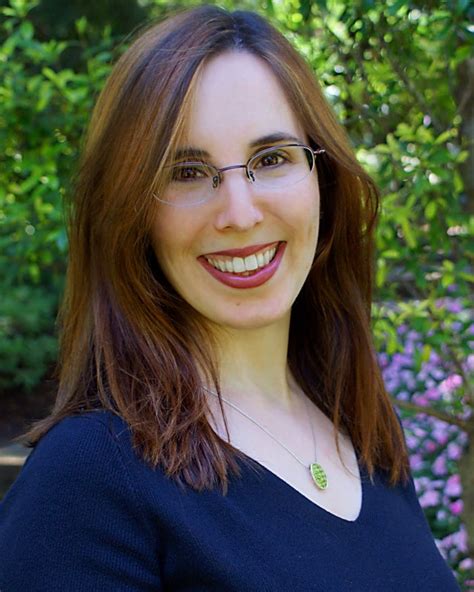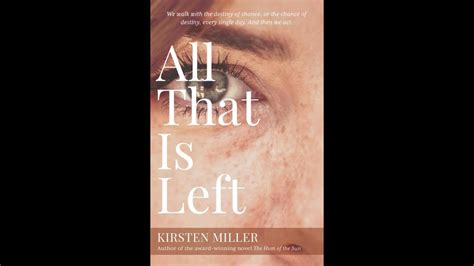A Quote by Ian Mcewan
The evasions of her little novel were exactly those of her life. Everything she did not wish to confront was also missing from her novella--and was necessary to it.
Related Quotes
Little Lotte thought of everything and nothing. Her hair was as golden as the sun's rays, and her soul as clear and blue as her eyes. She wheedled her mother, was kind to her doll, took great care of her frock and her red shoes and her fiddle, but loved most of all, when she went to sleep, to hear the Angel of Music.
of all the unusual features of Stargirl, this struck me as the most remarkable. Bad things did not stick to her. Correction: her bad things did not stick to her. If we were hurt, if we were unhappy or otherwise victimized by life, she seemed to know about it, and to care, as soon as we did. But bad things falling on her -- unkind words, nasty stares, foot blisters -- she seemed unaware of. I never saw her look in a mirror, never heard her complain. All of her feelings, all of her attentions flowed outward. She had no ego.
Yet there were times when he did love her with all the kindness she demanded, and how was she to know what were those times? Alone she raged against his cheerfulness and put herself at the mercy of her own love and longed to be free of it because it made her less than he and dependent on him. But how could she be free of chains she had put upon herself? Her soul was all tempest. The dreams she had once had of her life were dead. She was in prison in the house. And yet who was her jailer except herself?
She realized how many of her beliefs were either unrealistic or belonged to her deceased parents and her ex-husband. She also realized that her expectations for herself and others were sometimes too rigid. She was trying to live up to what everyone else said was best for her, which made her depressed and hard to be around at times. Once she changed her beliefs about herself and others, she began to smile more and enjoy life.
She sat leaning back in her chair, looking ahead, knowing that he was as aware of her as she was of him. She found pleasure in the special self-consciousness it gave her. When she crossed her legs, when she leaned on her arm against the window sill, when she brushed her hair off her forehead - every movement of her body was underscored by a feeling the unadmitted words for which were: Is he seeing it?
I think the relationship [in Aquarius] with her nephew shows that she's not nostalgic. She just wants to preserve what is important to her - her records, her books, even some furniture. She doesn't want to leave that house because it is her home. That is where her kids were born. After moving so much in my life, I was touched by Clara's need to stay in that apartment. I love her life, and that may be why I connected to her so strongly. We are the most alike when we are fighting for our rights.
But there was still something missing. Something that nagged at her-an emptiness she couldn't explain. There were mornings she woke with her heart pounding wildly and the sensation of arms wrapped around her. But the feeling slipped away the moment she opened her eyes, and no matter how quickly she squeezed them shut, she couldn't recapture the contentment she'd felt.
But she did not take her eyes from the wheels of the second car. And exactly at the moment when the midpoint between the wheels drew level with her, she threw away the red bag, and drawing her head back into her shoulders, fell on her hands under the car, and with a light movement, as though she would rise immediately, dropped on her knees. And at the instant she was terror-stricken at what she was doing. 'Where am I? What am I doing? What for?' She tried to get up, to throw herself back; but something huge and merciless struck her on the head and dragged her down on her back.
... there had been the two little boys. Now they were gone, too. They loved her and called her and sent her e-mails and would still snuggle up to her to be petted when they were in the mood, but they were men, and though they would always be at the center of her life, she was no longer at the center of theirs.
She told her therapist it reminded her of coming home the summer after her freshman year at Rutgers, stepping back into the warm bath of family and friends, loving it for a week or two, and then feeling trapped, dying to return to school, missing her roommates and her cute new boyfriend, the classes and the parties and the giggly talks before bed, understanding for the first time that that was her real life now, that this, despite everything she'd ever loved about it, was finished for good.
Day and night she had drudged and struggled and thrown her soul into her work, and there was not much of her left over for anything else. Being human, she suffered from this lack and did what she could to make up for it. If she passed the evening bent over a table in the library and later declared that she had spent that time playing cards, it was as though she had managed to do both those things. Through the lies, she lived vicariously. The lies doubled the little of her existence that was left over from work and augmented the little rag end of her personal life.







































